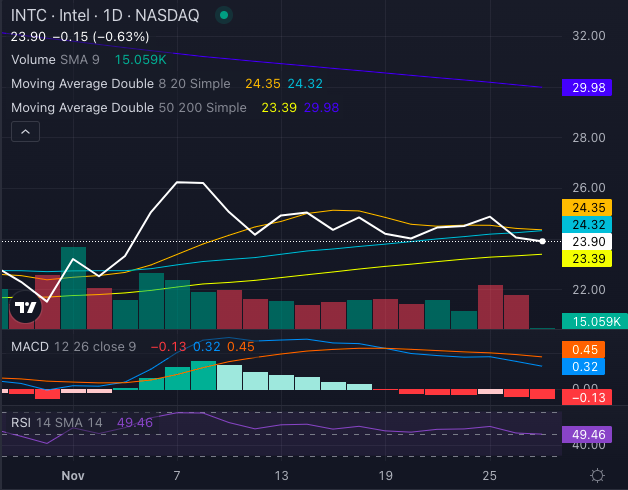
Intel Corp (NASDAQ:INTC) just secured a $7.86 billion grant under the CHIPS Act, marking a significant step in the Biden administration’s push to bolster domestic chip manufacturing.
But while this government lifeline aims to supercharge Intel's factory expansion, the struggling chip giant still faces formidable challenges as it tries to claw its way back to relevance.
A Much-Needed Boost For Intel
The CHIPS Act grant, slightly lower than the initial $8.5 billion promise, is part of Intel's strategy to expand its U.S. manufacturing footprint. CEO Pat Gelsinger hailed the funding as a pivotal moment for American semiconductor leadership, emphasizing Intel's commitment to ramping up operations.
However, the trimmed award reflects growing skepticism about Intel's execution abilities amid a rocky year for the company.
Read Also: Taiwan Semi’s Growth Fuels US Rise To Second In Chipmaking: Report
Clouds Over Santa Clara
Despite the CHIPS windfall, Intel is grappling with heavy losses and strategic uncertainty. The company reported a $17 billion loss last quarter and has slashed 15,000 jobs as part of cost-cutting efforts. Recent moves, like considering the sale of a minority stake in its Altera business, signal Intel's urgent need to stabilize finances.
Adding to the drama, rumors of a possible Qualcomm Inc (NASDAQ:QCOM) takeover have swirled, underscoring Intel's precarious position in the chip market.
Intel Stock Down 45%, Long Term Still Bearish
Intel's stock performance hasn't exactly inspired confidence, with shares down 45% over the past year.

Chart created using Benzinga Pro
Recent technical indicators paint a picture of indecision:
- Bearish Trends: Intel's share price of $23.90 sits below its eight-day ($24.35) and 20-day ($24.32) simple moving averages (SMAs), flashing bearish signals.
- Bullish Glimmers: The 50-day SMA of $23.39 and a moving average convergence/divergence (MACD) of 0.32 suggest potential short-term gains.
- Long-Term Pain: The 200-day SMA of $29.98 highlights a steep climb ahead.
While the CHIPS Act grant provides a much-needed boost, Intel's turnaround hinges on its ability to execute on its manufacturing goals and navigate a volatile market.
Investors, wary of its recent missteps, may need more than government funding to restore their faith in the Silicon Valley stalwart. For now, Intel remains a high-risk, high-reward play in an increasingly competitive chip landscape.
Read Next:
Photo: Tada Images/Shutterstock.com







